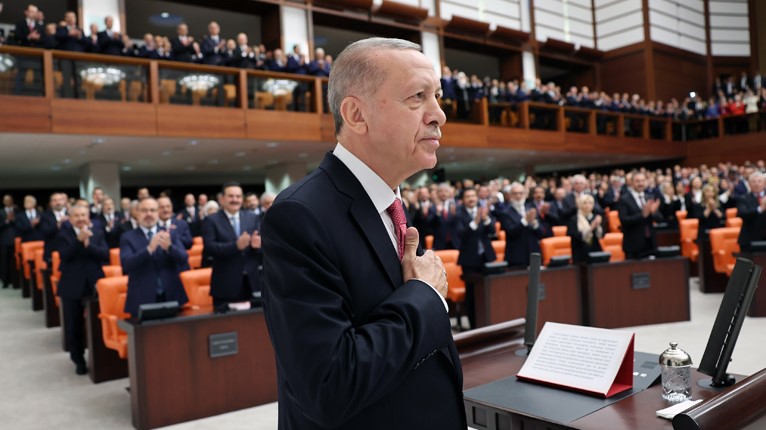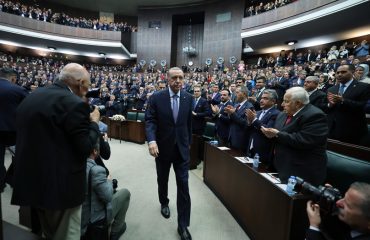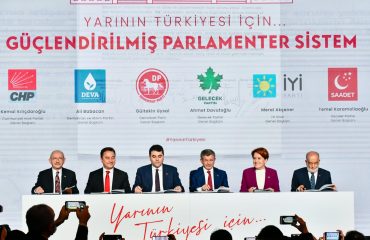

The row over the Costitution works for Erdoğan as a smokescreen to obscure the real problems such as the economic crisis.
President Tayyip Erdoğan is using the constitutional amendment as a smokescreen to obscure and distract attention from the major problems ahead.
On the night of April 28, days before Erdoğan’s meeting with CHP leader Özgür Özel, Chief Legal Advisor Mehmet Uçum published the text “What could be the main principles of the new constitution”, which alone shows that this attempt is aimed at attracting opposition reaction and distracting attention. Uçum’s text, which he skillfully embellished with expressions that aims to lure centrist and liberal circles, from “Atatürk, the leader of our Republic” to income inequality – as if it was others who paved the way – seeks to open the door to two outcomes:
1- Keeping the 50+1 percent condition for Presidency would allow the alliance with the MHP to continue and allow Erdoğan to run for a fourth term in the next election;
2- Article 4, which states that the first three articles about the foundations of Republic of Türkiye cannot be changed, will be sugar-coated as “getting rid of the coup constitution completely” and the principle of secularism and the definition of citizenship will probably be changed in the next amendment.
In this way, the aim is probably to get Özel to react to these remarks even before the meeting with Erdoğan and to start a new polemic.
The real agenda is in the smokescreen
However, Özel said that the President wanted to hear about the constitutional amendment proposal from him, not from his advisor. He also shared with the public that his agenda in the meeting with the President was not the Constitution, but the economic crisis, political lawsuits, problems of municipalities, foreign policy problems and the upcoming May Day. But he would “listen to” what Erdoğan has to say about the Constitution.
The truth is, neither the people nor politics, except for narrow groups, have a demand and need at the moment for a change in the Constitution.
The demand and need of the people are to get out of the economic crisis as soon as possible so that politics can move forward in a more democratic line within its own dynamics.
The AK Party lost the March 31st elections not because it failed to change the Constitution, but because it failed to get the country and the people out of the economic crisis it had dragged the country and the people into.
President and AK Party Chairman Tayyip Erdoğan knows this very well, as does his People’s Alliance partner, National Movement Party (MHP) leader Devlet Bahçeli.
What Erdoğan needs is to distract the public from the economic crisis and new austerity measures, the grave problems in foreign policy, the Ministry of National Education Ministry’s controversial new curriculum study and the March 31 showdown within the AK Party with a constitutional smokescreen.
Change in Parliament scenario
Moreover, there are two major obstacles for Erdoğan (even with the support of Bahçeli) to submit the constitutional amendment to a referendum.
1- Among the success guarantees of the Medium-Term Program (MTP) entrusted to Treasury and Finance Minister Mehmet Şimşek for the exit from the crisis is that there will be no elections until 2028. Investors know that every referendum in Turkey is no different from an election and carries the risks of an electoral economy that would violate the MTP for the AK Party government.
2- The risk of losing. If a referendum in which Erdoğan risks the exit from the economic crisis is not accepted, his 20-odd years in power will be severely damaged.
Therefore, Erdoğan may resort to the scenario of trying to gather 400 votes to pass a constitutional amendment in the Turkish Grand National Assembly (TBMM) instead of a referendum, where he would need 360 out of 600 seats, leaving the problems behind a smokescreen and drawing attention to the agenda he wants to put forward.
Saving time by showing the impossible
There are two ways to do this.
1- Continuing with the MHP and finding 400 votes through a bargaining process that requires concessions with the IYI Party and other parties in the parliament, which has become extremely fragmented,
2- Continue with the CHP and negotiate a new system of governance that would reduce the powers of the parliament, including budgeting, oversight of the executive and vote of confidence, and the president’s influence over the judiciary.
If Erdoğan repeats Uçum’s suggestion to Özel when they meet, it means that he already wants no CHP option.
What remains is to negotiate with the MHP and other parties, including the DEM and HüdaPar, with a wink to the Kurdish question and secularism. It is not a coincidence that Uçum made this suggestion the day after the IYI Party changed its leadership and elected Müsavat Dervişoğlu in charge.
On March 31, the AK Party, which fell behind the CHP for the first time, wants to make the AKP say “amen” to the constitutional amendment like a “prayer that won’t happen”. It seems difficult. But Erdoğan needs both time and distraction from real problems. He is using the constitutional amendment as a smokescreen for this purpose.


